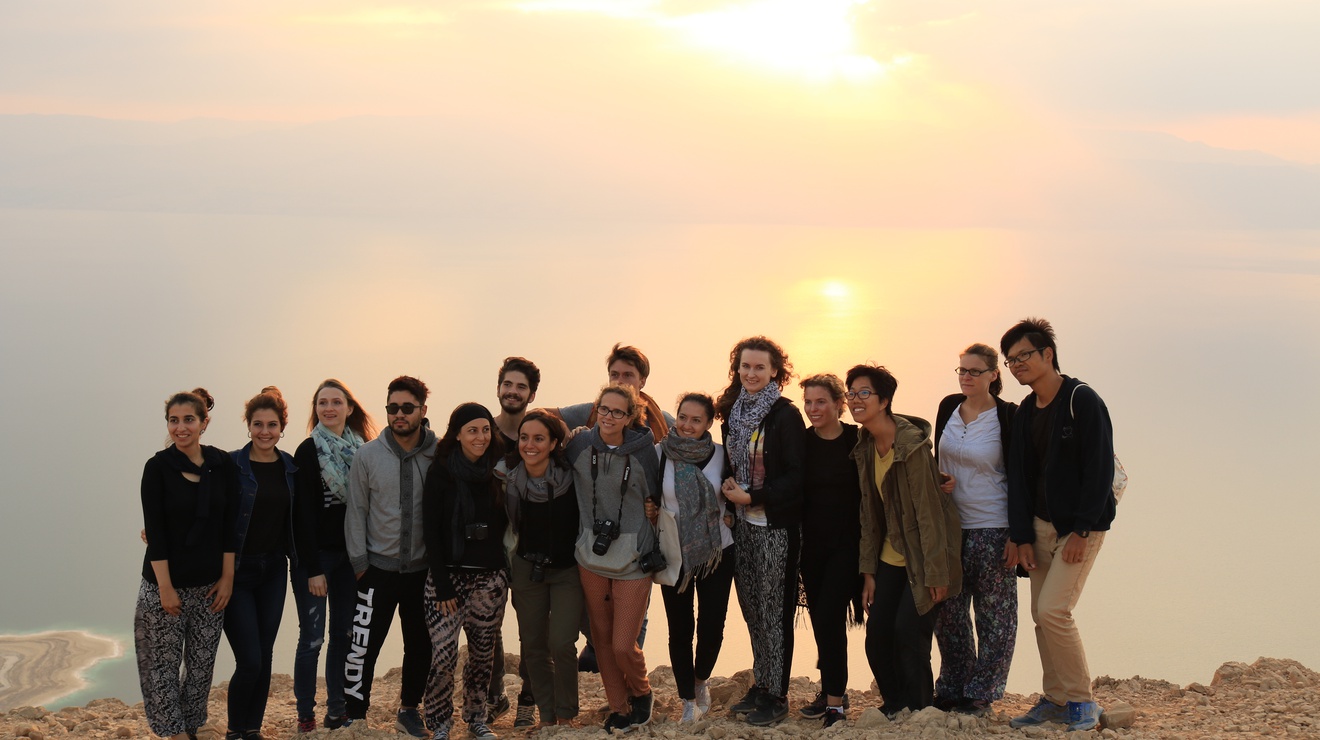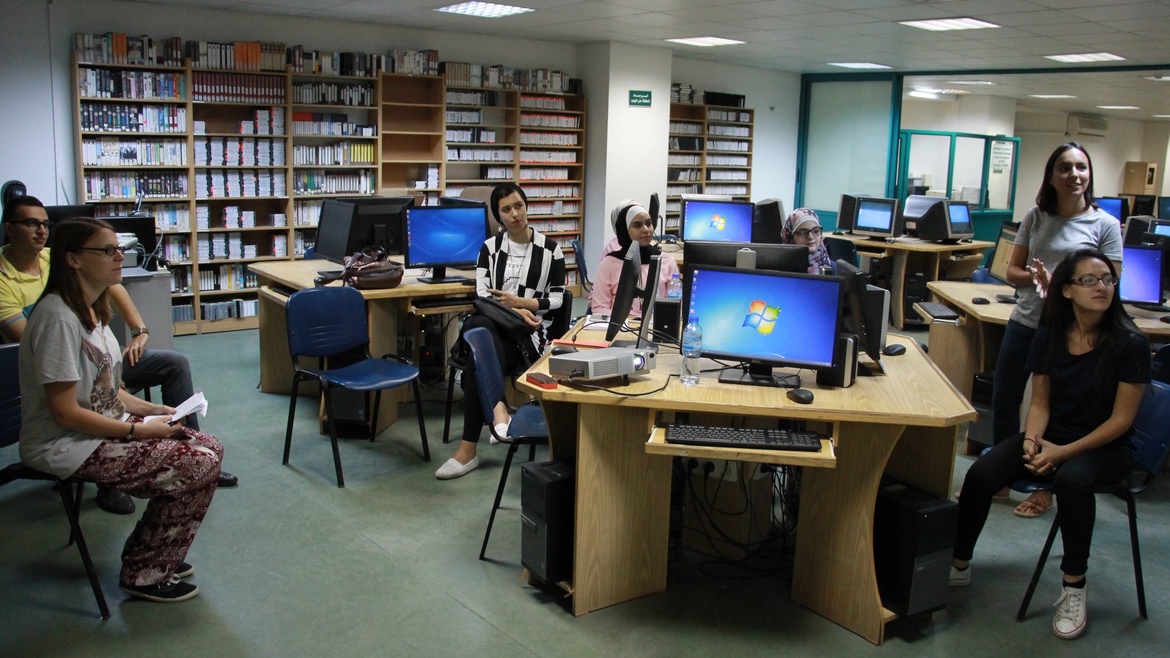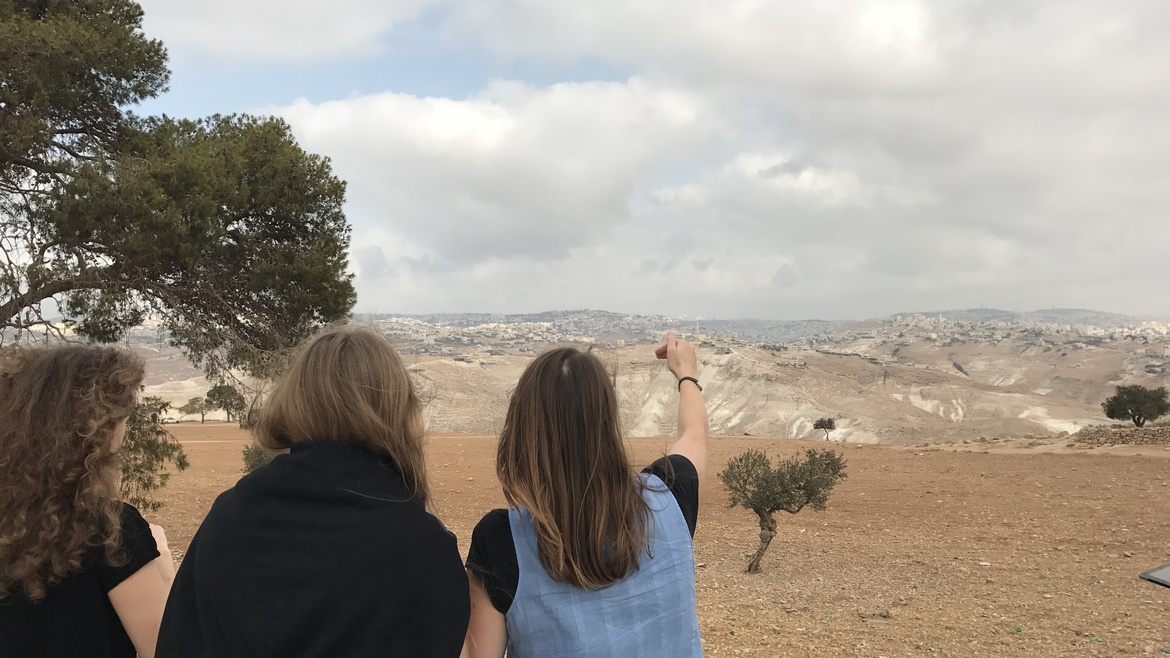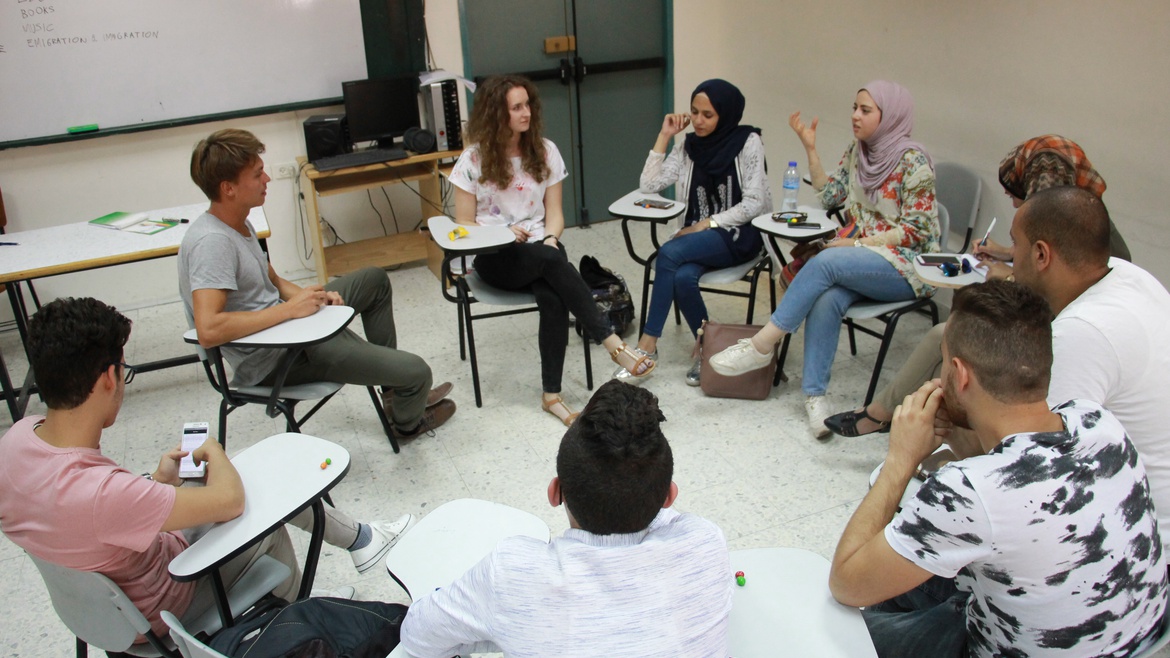We Were Welcomed Wherever we Went

We were welcomed wherever we went in Palestine. The Zajel Team of the An-Najah-University welcomed us in their excellent educational institution and its amazing students even welcomed us to their lovely family homes.
By: Eyvone Milosovich
The committed political activists welcomed us to the group's house in Hebron city. The friendly shop owner in the Old City of Nablus welcomed us to his soap factory. The elderly farmer welcomed us to his beautiful vegetable fields in Battir village. The enthusiastic pupils welcomed us in their youth center in Jenin's traditional neighbourhood. The well-informed human rights activists welcomed us to the contested streets of Bethlehem. The hospitable Al-Rashaydeh-Beduins welcomed us to their comfortable tents in the desert. The wise community leaders welcomed us in their cultural centers for refugees in several cities. Wherever we went in Palestine – we were welcomed.
And with each‚Welcome!‘ we were invited into a conversation and with each invitation we learnt something new and revealing about Palestine. Everyone spoke with pride of their lands and we could deeply emphasise how the Palestinians love their pristine way of life. We could even feel it ourselves when we were invited for traditional Palestinian dinners at the family host night. We could share the sentiment when roaming through the bustling Palestinian markets. We could sense it when we drove along the rolling hills covered with ancient olive trees. We could experience it when we reached a mountain top at the end of the desert and watched the sunrise over the Dead Sea.

We had many opportunities to appreciate what’s precious in Palestine. But in the right moments the Palestinians also spoke honestly - with impressive resilience and a strong sense of peaceful resistance - about their long-standing hardship. We had sessions with Palestinian professors and learnt so much about the historical and political context of the current situation. However, our education on the Palestinian cause extended far beyond the classrooms and lectures as we spent more time traveling to various destinations all over the country. In each place we were engaged in informative exchanges with locals, always encouraged to listen carefully and ask critical questions.
But we always heard of the same history and we kept discovering the same communal story line. The Palestinian cause is not only an individual experience of personal trouble.
It’s the distress of the whole Palestinian people and their communities as they are trying to survive the illegal Israeli occupation which was brought onto them in an act of war.
We learnt in various settings that the illegal occupation comprises innumberable discriminatory policies against Palestinians which visibly affect every aspect of their personal and communal life. There are so many measures forced onto Palestinians which make their lives difficult and which hinder their well-being and development on different levels. It’s well-known that these Israeli practices against Palestinians fundamentally mean constant human rights violations. As we traveled the country, we could see some of the more visible effects of the occupation for Palestinians in practice, for example at Israeli checkpoints. Surely, this type of treatment is unacceptable in any case. But somehow it’s even more heart-breaking to see such discrimination imposed on the Palestinians who have welcomed us into their lives, who have become our dear companians and beloved friends. This might be one of the reasons why exchange programs like Zajel are so important to convey the Palestinian cause: because they enable outsiders to build personal connections with the very people concerned.
Indeed, we learnt so much about the illegal occupation when we got to know the local Palestinian population in various places. We had a conversation with an exhausted Palestinian day-labourer who told us about his difficulties of working and crossing the borders legally in places that used to be his own lands. We sat with Palestinian refugees who explained the challenges of living in crammed camps for decades with a defined right but no definite prospect of returning to their houses. We chatted with a Palestinian teenage boy who lived in an occupied street and explained to us how his life at home was made unbearble by the checkpoints and harrassments. These were just a few examples of the dialogues we had with local Palestinians.

There are so many aspects of valuable Palestinian life which are being destroyed, obstructed or hindered. This writing can really just begin to mention one these aspects.
The issue which struck a cord was the illegal confiscation of Palestinian lands and goods and the restriction of movement and activities of Palestinians. They are by no means the only or the most important issues. But they‘re clearly visible to the bare eye which makes them somehow easier to expose. Hence we didn’t just hear about the illegal occupation. We saw it for ourselves in many places.
We looked at how the infamous wall and other massive constructions obviously served the main purpose to even further restrict the movement and activities of Palestinians. We saw for example how farmers were forbidden to cultivate their own fertile lands with olive trees, vegetables or farming animals. This meant the livelihoods of countless Palestinan families have been destroyed and a farming culture which has flourished for centuries was being devestated.
The conflict of the illegal occupation was even more visible in the contested cities. For example, in Bethlehem Palestinian inhabitants were simply given official demolition orders for their houses from the Israeli authorities – for utterly void reasons – to force the residing families out of their own homes. Especially in the closed-off streets in Hebron city we also witnessed how entire Palestinian neighbourhoods have been ruined by checkpoints which prohibited residents and shopkeepers to enter their own properties.
Throughout the cities we ourselves got to feel some of the effects of these barriers. They leave a suffocating and opressing impact on one’s body and psyche. Even for a mature adult it’s hard to endure the procedures at checkpoint crossings. What does this experience do to innocent Palestinian children who are subjected to this humiliating treatment on a daily basis as they try to move through their home towns?
At the same time but by the other side of the power structure, more Palestinian homes are forcefully taken over and occupied, Palestinian streets and neighbourhoods are being besieged, smaller illegal outposts keep being established and even larger illegal settlements continue to be built and expanded on annexed Palestinian lands by the Israeli government. Those places are always highly monitored by Israeli armed soldiers in military posts and Israeli settlers carring their own weapons. The original Palestinian inhabitants of these areas are no longer allowed to enter or to even come near the properties which actually belong to them.

What’s most important to remember is the following: All these arrangements are not only unjust according to the Palestinians‘ personal feelings and sentiments. This occupation is illegal under international law!
We explored Palestine continuously for two weeks, spoke extensively with locals and carefully observed our surroundings. But still, we could only begin to grasp how all that is precious for Palestinians is under constant threats of intentional destruction by the Israeli government. Now we are still trying to comprehend what this means for Palestinians as individuals and as a people. What are the perspectives for their future and how can they maintain hope for their children? Surely, we can be impressed by the incredible resilience of these people. But instead of simply praising the Palestinians‘ strong committment to peaceful resistance, we should rather support them to bring to an end the occupation which makes this type of endurance neccessary.
It remains a difficult task to explain to outsiders what’s going on inside Palestine and it’s a challenege to convey this desperate need for urgent change to the people around the world. We as guests owe it to the Palestinians to speak about the Palestinian cause when we return to our homes and we have to bear true witness to the things we have seen in Palestine. But more importantly, the Palestinians must have the opportunity to represent themselves and educate others on their cause. So truthfully speaking, the only meaningful manner to learn anything about Palestine and to comprehend it in a more holistic way is to come and see for yourself. For sure, everywhere you will go, you will also be welcomed in Palestine.
And we, too, hope to be welcomed back in Palestine very soon. We wish from our heart that upon our return to Palestine in the near future, we will find all those above-mentioned challenges to solely lay in the past and to be history by then. We want to learn how it will have been possible to peacefully overcome the illegal occupation and realise how amends will have been made to the Palestinians who were hurt so deeply. We want to see Palestinians live their precious lives in self-determination and dignity, truly enjoying all freedoms and human rights.
We simply want to see all Palestinians live the lives they have always deserved.

Zajel Youth Exchange Program:
The organiser, the volunteers, the students, the city
But let’s go back to the beginning of being welcomed! The organisation which first welcomed us to Palestine is called Zajel Youth Exchange Program, which is based at the An-Najah University in Nablus. Its team has the most dedicated members I’ve ever met. Everyone in the Zajel Project is fully committed to their heartfelt mission: to educate and raise awareness about the Palestinian cause. The reason for this strong committment to the program is probably their deep understanding that their entire future might depend on the world to grasp what has happened and is still happening in Palestine.
The organiser of the Zajel Program, called Ala, puts unequivocally all his efforts into fulfulling this high ambition. He planned and lead through a very packed two-week workcamp that brought up so many new perspectives, raised so many questions, provoked so many thoughts and stirred up so many emotions. Ala himself is an amazing educator with a seemingly endless treasure of knowledge, context and stories. As an organiser he was in charge of finding well-educated staff for lectures, suitable guides to various locations and key persons to give us more detailled information about different issues. For these occassions, Ala chose excellent professors, human rights activists and community leaders who were open to share their experiences and expertise with us. But something which impressed me deeply was how Ala often started conversations with the common people we met along the way. In these dialogues, he picked up on their everday-lives and stories so that we could learn how all of Palestinians‘ very existence was and still is impacted by the power structures in the region. Ala knows from his extensive practical knowledge how to lead the participants of the program into challenging positions where they can become more aware of the Palestinian cause without ever putting them in dangerous or risky situations. In this way, the program brought closer to us many new – and honestly often heart-breaking – revelations about the living conditions of people in Palestine.
But Ala acknowlegdes fully that seeing the amazing beauty of this country is just as important to understand the passionate love of Palestinians towards their homeland. Hence he made sure we had many unforgettable opportunities to appreciate the stunning natural beauty, the aestatically pleasing architecture, the incredibly hospitable locals, the delicious traditional dishes and the typical catchy music. And it’s sure that every guest leaves this place with having found at least one entity which they love about Palestine!
But of course, this incredible workcamp could not be implemented without the relentless efforts of the numerous local Palestinian volunteers of the Zajel team. I was so moved to see how the whole Zajel team welcomed us and took such good care of us throughout the entire program. Even though running such a workcamp is surely exhausting for the local volunteers, everyone was so kind to us. They were incredibly patient and helpful with anything that came up. The local volunteers weren’t just available to organise trouble-free excursions and pleasant free-time activities. At the same time they were our insightful guides and popular companions who shared with us their knowledge, stories, laughters and so many sweet moments. Thanks to the contributions of the local Palestinian volunteers, our workcamp was filled with so many valuable and enrichending experiences which we will not forget.
We had many equally positive encounters with the Palestinian students of the An-Najah-University who participated in the various workshops we offered throughout the workcamp. Even though everyone felt a little bit shy and nervous at the first meeting in the workshop group, we very quickly established a pleasant and productive atmosphere with each other. We, the international volunteers, were able to present our various ideas for the workshop and the students explained to us which topics were most relevant for them. In the coming meetings we managed to cover most of the questions asked and still had enough time for interesting conversations on other issues. We, the international volunteers, were very impressed with the Palestinian students who have proven many times that they were so dedicated to their success in studies. The young scholars were already performing well academically and yet so eager to learn more and improve their skills in the workshops. It’s obvious these young Palestinians have very high ambitions for themselves and their careers. But they also cared for the common welfare of the Palestinian people and explained to us how they contributed to strengthening their beloved communities, for example by volunteering for local organisations or charity projects. We, the international volunteers, could recognise very soon that all the local students had already so many competences and skills and we were convinced they will continue to grow and strive if the surrounding conditions are in their favour. Hence we hope dearly that the future holds many excellent opportunities for these young Palestinians so they can live up to their expectations and fulfil their true potential.
The other residents of Nablus are also hospitable and kind. We felt very welcome when we strolled through the city of Nablus. We enjoyed particularly the Old Town with its many small shops and incredibly friendly shop owners – some who have been in the same market places for generations. It’s definitely worth a visit, especially to buy some high-quality traditional Palestinian goods with a local expert. But we have to admit there is a big challenge for shoppers there: too many tempting sweets one simply cannot resist!
In closing I can just say that I’ve had many incredible and unforgettable experiences with all the Palestinians who welcomed us in their homeland. Even though I was sometimes overwhelmed by all the new places and insights, I always felt very well taken care of and perfectly safe. For anyone who is interested in either learning about the Palestinian cause or anyone who simply wants to experience life in Palestine, I can only recommend participating in the Zajel Youth Exchange Program. It’s insightful and educational, but it’s also fun and beautiful. And most importantly, the feeling of being welcomed in Palestine is one which really stays in your heart.
We want to thank everyone from our hearts for welcoming us to Palestine.






